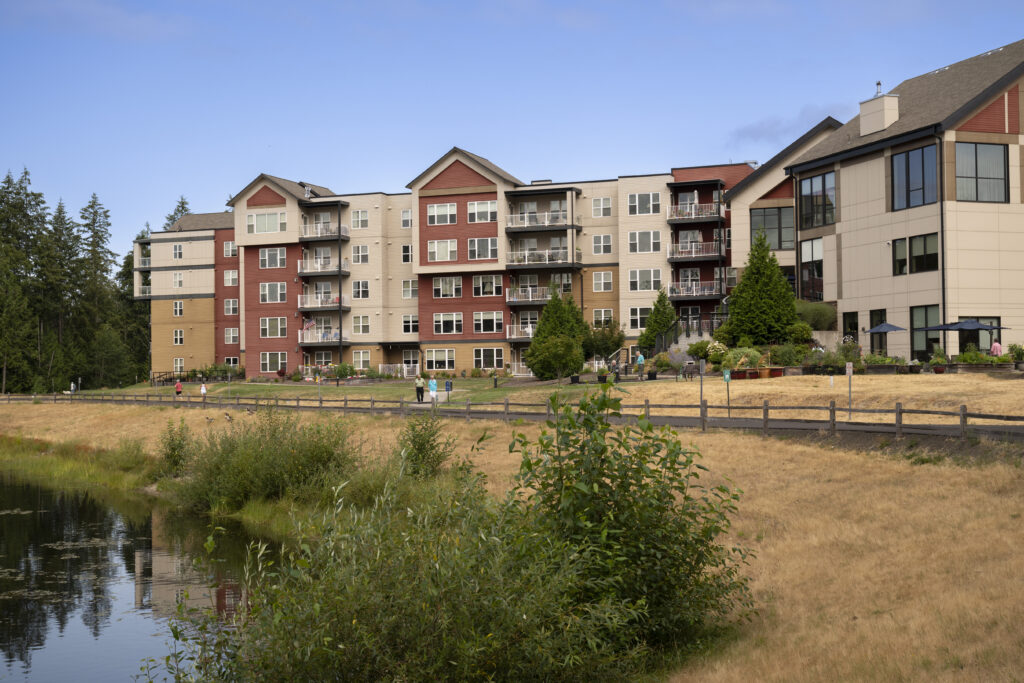Did you know nearly 40% of all U.S. households have at least one pet dog? If you’ve ever had a furry friend of the canine kind, then you already know the sheer joy a dog can add to everyday life.
Along with the unconditional love dogs offer, canine companionship is rewarding in many other ways— including its health benefits. Some of those benefits might be of particular interest to older adults, such as the potential for slowing cognitive decline (more on that below).
If you’re thinking about getting a dog, there’s a lot to consider. Armed with the right information, you can make a great choice for both you and your new best buddy!
A Puppy or an Older Dog?
It’s a universal truth: Puppies are irresistible. They’re also a big commitment.
Puppies are a lot like human babies. They often don’t sleep through the night right away. They need to be potty trained and will almost surely make messes before they’re housebroken. They teethe, which means they will chew on things they aren’t supposed to. They need to learn how to get along with others. And they will probably develop some bad habits that will have to be addressed.
Puppies are also little bundles of energy, and that rambunctiousness may not dissipate for several years. Some breeds, such as the Jack Russell terrier, border collie and husky, are known for having almost endless energy well into their later years. These may not be the best dog breeds for seniors if they’re to be adopted as puppies.
How much time and energy can you devote?
Lively dogs, which means all puppies, need a lot of exercise and playtime to prevent boredom (and mischief). To help them feel secure and know what’s expected of them, puppies also need a routine and consistent rules.
Energetic dogs may be more challenging to walk, depending on how well they’ve been trained. They sometimes want to walk their owner, pulling on the leash in their hurry to explore. This can pose a risk for older adults who may have less strength or poorer balance than they once had.
The key is to choose a dog that will mirror your level of energy and activity. Are you looking for a dog to join you on long hikes or one that will be content with less exercise?
Why an older dog may be the better option
Adult dogs are usually housebroken, especially if they’ve been someone else’s pet. They’re most likely already trained and socialized, too. Plus, their temperament is more of a known factor, so it’s often easier to know what to expect when you get them home.
If you’ve decided you want a particular breed, you may still be able to find an older dog relatively easily. While breeders generally offer only puppies for sale, at least 5% of shelter dogs are purebreds, many of which are adults. Some shelters have waiting lists and will notify you if they get a dog of the breed you want. You can also search online for rescue groups that specialize in a certain breed.
Note that the adoption fees for older dogs are typically lower than fees for puppies, and if you adopt or rescue a purebred dog rather than buying one from a breeder, you’ll most likely pay thousands of dollars less.
Another important consideration
Lifespan is another point to think about when deciding whether to get a puppy or an older dog. A dog could live anywhere from 10 to 15 years, and in some cases even longer.
Will you be able to care for your beloved pup that long? If you become ill or injured, is there a family member or friend who can fill in for you?
Good Dogs for Seniors in Retirement Communities
Although not all senior living communities welcome pets, many do. If you live in a retirement community or are planning to move into one, you’ll want to think about how that will factor into your decision to get a dog. For instance:
- Do (or will) you live in an apartment or a single-family dwelling? Your living space may limit the size of dog you should consider.
- If you’re in an apartment building, is your home near the elevator or exit? You’ll need to walk your dog at least a couple of times a day.
- How easy will it be to have your dog groomed and take it to vet appointments?
- Do a lot of the other residents have dogs? You may not be the only one who enjoys socializing with the neighbors — your dog might make some new friends, too. Plus, you may be more likely to find volunteers to pet sit for you if many people in the community have dogs of their own.
In general, if you’re in a senior living community, you’ll probably want to opt for a small or medium-size dog. To be considerate of your neighbors, you’ll want a dog that won’t be too boisterous or bark a lot.
You may also want to look for a dog that will be good around small children. Even if you don’t have young grandchildren who will visit, others around you might.
Some breeds to consider include the Boston terrier, toy or miniature poodle, miniature schnauzer, pug, Pekingese, French bulldog, cocker spaniel, King Charles spaniel, Maltese and Shih Tzu.
Ultimately, the best dog for seniors, no matter where they live, is one that suits the individual’s physical abilities, living environment, lifestyle and personal preferences.
Health Benefits Associated With Having a Dog
Studies demonstrate that having a pet, whether it’s a dog, cat, bird, bunny or other animal, confers health benefits such as:
- Reduced stress
- Lower blood pressure
- Improved cholesterol levels
- Lower risk of loneliness and depression
- Less need for medications
Older adults who take daily walks with their dogs may get more exercise than they would if they didn’t have a dog, which can help with mobility and weight control. They may also get more fresh air and sunshine, and the walks provide more opportunities for socializing.
Additionally, recent research conducted at the University of Michigan Medical Center indicates that extended pet ownership, defined as five years or longer, may help slow cognitive decline in older adults. Specifically, seniors (age 65 or older) who owned a pet for at least five years had higher composite cognitive scores at the end of a six-year assessment period as compared with those who didn’t have a pet. They also did better on tests of immediate and delayed word recall.
Would a Different Pet Be a Better Choice?
Other pets provide many of the same emotional rewards and health benefits as dogs. If mobility is an issue, then having to walk a dog every day may present challenges and even pose some risks.
A cat may be a good alternative. Cats require less grooming, are usually quiet and do quite well living in an apartment. While many cats love to play, they also indulge in long naps and plenty of couch time. Indoor cats generally live longer than dogs, so adopting an older cat instead of a kitten may be the way to go — and there are always older cats available for adoption through shelters and rescue organizations.
We Love Pets at Heron’s Key!
Ours is a very pet-friendly community with many great walking paths. New residents are often surprised to see how many people here have dogs, and quite a few have cats.
We see every day how the bonds between residents and their pets keep them happy and healthy. Even those who don’t have a pet of their own enjoy saying hello to their neighbors’ dogs while out walking. Some gladly pet sit for neighbors who are traveling.
If you’d like to come take a look around, contact us to schedule a visit. There’s a good chance you’ll see a resident dog or two while you’re here!
Featured Image: Jake Johnson Pictures








